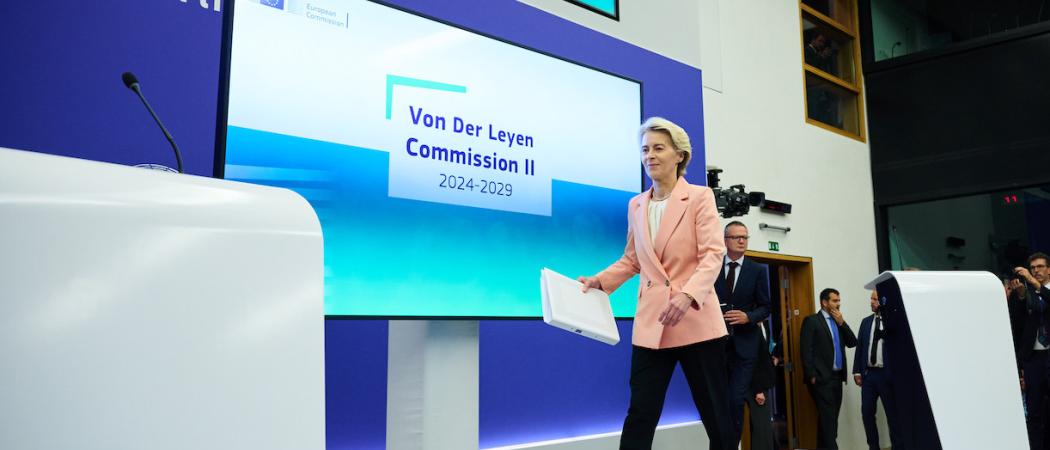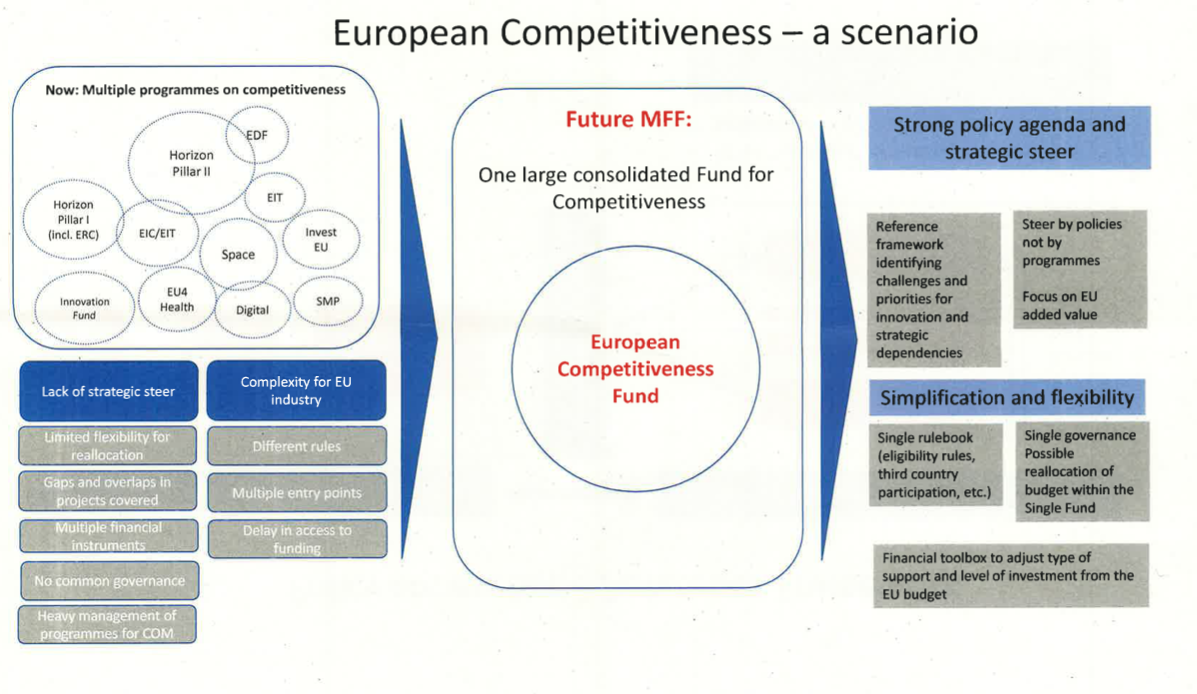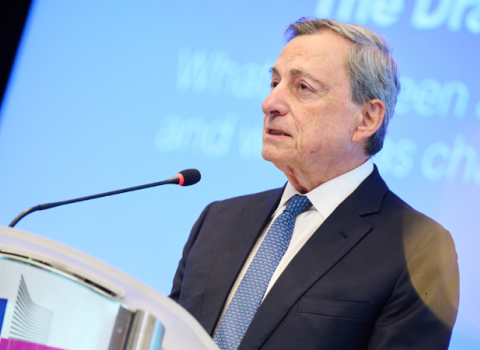Internal memo details how Ursula von der Leyen wants to restructure EU science and technology programmes

The European Commission is making moves to bundle all research and innovation funds, including the European Research Council (ERC) and the European Innovation Council (EIC), into a new mega competitiveness fund that would be launched under the new multiannual budget due to start in 2028.
A presentation by the Commission’s budget directorate reveals a scenario where about a dozen research and innovation programmes would be amalgamated into the European Competitiveness Fund, in an attempt to concentrate and streamline EU efforts to resuscitate innovation, productivity and economic growth.
The list, in a presentation dated September 2024, includes:
- Horizon Europe Pillar I (ERC included)
- Horizon Europe Pillar II
- EIC and EIT
- European Defence Fund
- Innovation Fund
- EU4health
- Space
- Digital Europe
- Invest EU
- The Single Market programme
The Commission says these programmes lack “strategic steer” and are too complex, which makes it difficult for industry to benefit from EU funding. The document also bemoans limited flexibility for reallocating funds, too many rules, gaps and overlaps, delays in access to funding and a lack of common governance. The killer problem: managing all these programmes has become too cumbersome for the Commission.
The proposed reform envisions a single fund to fix all of the above. The Commission argues the new Competitiveness Fund would follow a “strong policy agenda” with a single rulebook covering eligibility rules and third-party participation, and have single governance.
The proposal follows on from the high-powered report by EU political heavyweight, Mario Draghi, explaining clearly what the Commission’s economists already knew: the EU’s productivity and economic growth has been slowing down due to underinvestment in science and technology, and also because 27 economic jurisdictions and overbearing state aid and competition rules are undermining the EU single market.
Negotiations between the Commission and member states are in full swing over legislative proposals for the next Multiannual Financial Framework and the tenth Framework Programme for research and innovation, with the outcomes due in the first half of 2025.
It is likely the root and branch restructuring put forward by the Commission’s budget directorate will get diluted through political negotiations and the ordinary EU legislative process. But some research and innovation stakeholders in Brussels say this would be a good opportunity to shake things up and rethink the way EU funding works.
Mattias Björnmalm, secretary general of CESAER, a non-profit association of universities of science and technology, sees the new structure as an opportunity to put science and technoloy at the centre of the EU’s competitiveness agenda, as it was highlighted again and again is speeches by von der Leyen and the reports from Draghi and former Italian prime minister Enrico Letta.
“The first thing that stands out to me here is that this is a potential huge opportunity, but the very first adjustment that needs to be made to this proposal is to be true to what von der Leyen, Draghi and Letta say, to put research, innovation and science and technology at the centre,” said Björnmalm.
Portugal’s ex-science minister Manuel Heitor is chairing a high level group which is expected to publish a report with recommendations for the principles and structure of FP10 next week.
But a super-fund that includes FP10 plus space, defence research and innovation funds, would also require a super-budget, Björnmalm said. “If we find a way to do that, then we're not talking €100 or €200 billion, but over a trillion euros.”
Meanwhile, others are calling on the Commission’s research directorate to evaluate the potential consequences of bundling everything under a competitveness super-fund. Kurt Deketelaere, secretary general of LERU, took to social media on Thursday to ask Marc Lemaitre, head of the research directorate, to “share his views” on the draft MFF proposal.
The memo also includes a new principle, under which the Commission could ask member states for reforms in exchange for EU funding.
Björnmalm says this would be an opportunity to finally ensure member states reach R&D expenditure targets set 20 years ago, and to implement the fifth freedom for research. “This would be an opportunity to help move all of Europe forward, to not rely on kind of shifting winds at regional and national levels,” he says.

Rumours come true
After Commission president Ursula von der Leyen announced the portfolios of her new college of Commissioners, rumours started spreading in Brussels about whether FP10 would keep its three pillar structure as a standalone programme in the next multiannual budget, or if parts of it would be subsumed into the proposed Competitiveness Fund.
German MEP and former co-rapporteur for Horizon Europe Christian Ehler warned the EU needs to make a careful assessment of whether it makes sense to integrate research into a competitiveness fund. He also noted that MEPs will have a say in the process and “the majority in the Parliament is for a ringfenced programme”.
“You have to be very careful whether it makes sense to some extent to integrate research into a competitiveness context, or is it just the old French administrative dream to get this super-budget where all is squeezed in,” he said.
Commission structure
When Von der Leyen announced her new college of commissioners it became clear that things would change a lot. She named Ekaterina Zaharieva to serve as the commissioner for start-ups, research and innovation.
But R&D policy will not be limited to Zaharieva’s portfolio. Von der Leyen’s plan spreads science and technology across many of the other job descriptions.
Stéphane Séjourné, will be executive vice president for Prosperity and Industrial strategy and will contribute to the set-up of the Competitiveness Fund.
Henna Virkkunen, will be executive vice president for Tech Sovereignty, Security and Democracy. She will help Zaharieva set up an artificial intelligence research council and oversee increased efforts to boost investment in the next wave of frontier technologies, including supercomputing, semiconductors, the Internet of Things, genomics, quantum computing and space technology.
Virkunnen will also develop a “long-term EU quantum chips plan”, as suggested by Mario Draghi in his report on EU competitiveness.





 A unique international forum for public research organisations and companies to connect their external engagement with strategic interests around their R&D system.
A unique international forum for public research organisations and companies to connect their external engagement with strategic interests around their R&D system.